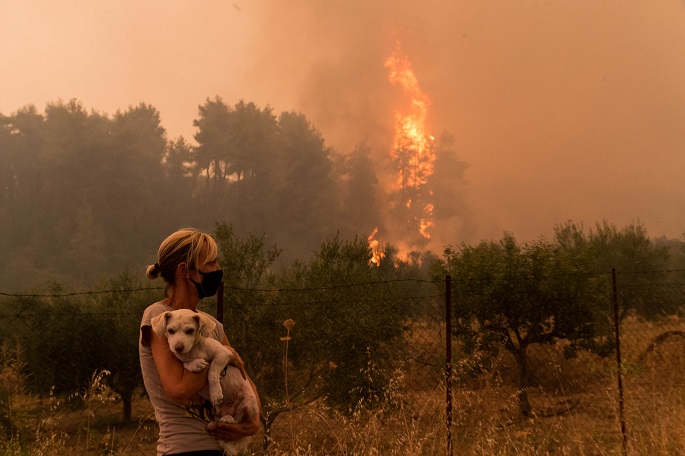Europe awakes from apocalyptic jiffy for unity against climate change
Published : 11 Aug 2021, 01:05
Updated : 11 Aug 2021, 01:08
For Europe, the summer of 2021 has by no means been easy -- from unprecedented floods to wildfires, the continent has been seeing the devastating consequences of delayed climate action clearer than ever, reported Xinhua.
For many scientists, this havoc is just the start of even more extreme weather events ahead, unless the world takes immediate steps to significantly reduce greenhouse gas emissions.
To raise global awareness to potential human-induced climate changes, the Intergovernmental Panel on Climate Change (IPCC), a body of the United Nations, released a report titled "Climate Change 2021: the Physical Science Basis" on Monday.
EXTREME WEATHER EVENTS
Forest fires are common during Greece's hot, dry summers, but the scale of the current ones this summer has been unprecedented.
Lenio Myrivili, a Greek expert in urban resilience and climate adaptation, told Xinhua in a recent interview that Greece, under a moderate scenario in the next few decades, may experience a mean temperature rise in the summer months between 2-3.8 degrees Celsius, which means 15-20 days of heatwaves more per year and 12 percent less rainfall per year on average.
Myrivili was recently appointed by Athens' mayor as the city's Chief Heat Officer, the first post of its kind in Greece and across Europe.
"It acknowledges the fact that heat is becoming more and more an issue for cities ... and we have to start really mobilizing around," Myrivili said.
In Albania on southeastern Europe's Balkan Peninsula, wildfires which erupted two weeks ago continued on Monday in various mountainous areas, where large areas of forests, pastures and fruit trees were scorched.
People still have fresh memories of the recent torrential rain and deadly floods in western Europe, about which German Chancellor Angela Merkel has said, "the German language hardly has words for the devastation that has been wrought."
German government officials said that this year, with storms, floods, heavy rain and hail on record, could turn out to be one of the most damaging since 2013.
In Belgium, according to the country's crisis center, around 120 cities and towns were affected by the floods after days of torrential rains and burst rivers that had been unseen in Belgium for almost 200 years.
ALARMING CLIMATE CHANGE
Jens Hesselbjerg Christensen, a professor at the University of Copenhagen, and also a review editor of the IPCC report, believes that it is becoming clearer that extreme weather events -- in the form of violent storms, floods and forest fires -- are linked to climate change.
"A decade ago, we could not say anything about whether a heat wave in southern Europe was climate change or completely natural fluctuations. Now we have many more studies and methodologies that allow us to comment on it," Christensen told Denmark's science website videnskab.dk.
Stefan Rahmstorf, an expert with Germany's Potsdam Institute for Climate Impact Research, told local media that events such as the recent severe flooding disaster in western Germany are becoming "more frequent as a result of global warming."
"With average temperatures rising, the probability of having periods of strong rains also increase, because the hotter the air gets, the more it can contains water steam, so that can potentially create more rains," Swiss meteorologist Mikhael Schwander told Xinhua.
Gian-Kasper Plattner, a Swiss scientist and one of the authors of the latest IPCC report, warned that extreme weather events such as the devastating rainfalls and scorching wildfires across Europe this summer would further increase and intensify.
"We're now able to attribute many more changes to the human activities and to greenhouse gas emissions," he told Xinhua, adding, "We can actually attribute them to human activities. Climate models that we run with scenarios show that these extremes will intensify and get stronger with increasing temperatures."
CLOSING WINDOW OF OPPORTUNITY
According to the latest IPCC report, regardless of future levels of global warming, temperatures will rise in all European areas at a rate exceeding global mean temperature changes.
Moreover, the frequency and intensity of hot extremes, including marine heatwaves, have increased in recent decades and are projected to keep increasing on the continent.
"Despite strong internal variability, observed trends in European mean and extreme temperatures cannot be explained without accounting for anthropogenic factors," the report said.
"Multiple climatic impact-drivers have already changed concurrently over recent decades. The number of climatic impact-driver changes is expected to increase with increasing global warming," the report added.
For Rebecca Shaw, World Wildlife Fund (WWF) chief scientist, the latest IPCC report is truly "a game changer" because it allows scientists to pinpoint humankind's role in driving extreme weather events with more accuracy and certainty than ever before.
"Scientists are certain that emissions from human activity have caused dangerous and permanent damage to the planet. Our window to reduce emissions and limit temperatures to 1.5 degrees Celsius is still possible, but it's closing rapidly," Shaw wrote in an email to Xinhua.
Describing the report as an important moment in the lead-up to COP26, the 26th United Nations climate change conference scheduled for Oct. 31 to Nov. 12 this year, Manuel Pulgar-Vidal, who leads the WWF global climate and energy practice, stressed that things will continue to get worse unless people immediately change course.
"That's why world leaders must use every opportunity, especially the upcoming G20 Summit and COP26, to deliver climate action that responds to the ambition needed to ensure the 1.5 degrees Celsius goal of the Paris Agreement does not slip out of reach," he urged.


